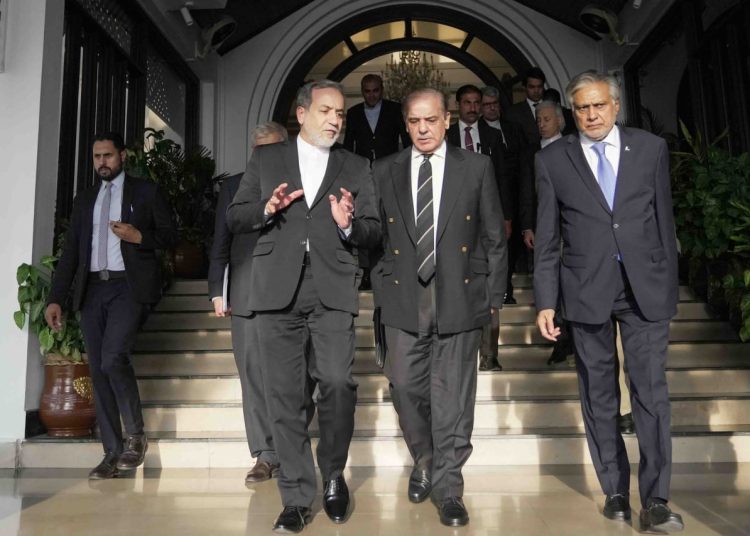Iranian Foreign Minister Abbas Araghchi is currently visiting Islamabad, where he met with his Pakistani counterpart to discuss the Middle East situation. During a joint press conference following their meeting, Araghchi stated, “Unlike Israel, Iran does not seek tensions but reserves the right to defend itself.”
In an era marked by intricate geopolitical dynamics and emerging regional threats, Iran and Pakistan are reinforcing their longstanding relations. With over 900 kilometers of shared border as well as religious, cultural, and linguistic affinities, the two countries stand as important players in shaping the developments within the region and the broader Islamic world. Their collaboration is not only crucial for bilateral relations but also for addressing the complexities of regional security and economic integration.
Recent high-level engagements underscore the commitment of both Tehran and Islamabad to deepen their ties. Iranian top diplomat’s engagement in substantive discussions with Pakistani officials in Islamabad, focuses on regional developments, particularly the Israeli crimes in the region. Central to these dialogues is the emphasis on countering the threats posed by Israel, establishing a ceasefire in Gaza and Lebanon and collaborative approaches to mitigate tensions and enhance stability in the region.
The visit of Iranian official facilitated meetings with key Pakistani officials, fostering an environment of mutual understanding. Such interactions are pivotal in aligning the perspectives of both nations on pressing regional issues and in formulating collective responses to counter common challenges including the Israeli actions.
Historical Relations
Since Pakistan’s independence, the relationship between Iran and Pakistan has been intrinsically close. The leadership of both countries has often shared converging viewpoints on numerous regional and international matters, particularly on Palestine. This historical alignment has been instrumental in fostering cooperation across various domains, including political, economic, and security spheres.
Their shared identity, steeped in cultural and historical commonalities, positions them to collaborate effectively. Few countries share such a rich interconnected heritage, which continues to be a cornerstone of their partnership.
Economic Collaboration and Trade Expansion
Economic synergy lies at the heart of Iran-Pakistan relations. As neighboring Muslim countries endowed with extensive economic capacities, they are well-placed to meet each other’s needs. The bilateral trade volume has witnessed an upsurge, reaching approximately $2.75 billion in 2023. This growth reflects a mutual recognition of the benefits derived from closer economic ties and a commitment to capitalizing on shared opportunities.
One of the pivotal mechanisms facilitating this economic cooperation is the Joint Economic Commission. The anticipated twenty-second session of this commission in Tehran symbolizes ongoing efforts to identify new avenues for collaboration and to resolve existing trade barriers. Concurrently, negotiations aimed at establishing a free trade agreement are in progress, with both nations working to finalize lists of sensitive goods and streamline trade regulations.
Enhancing Border Infrastructure and Connectivity
Understanding the strategic importance of seamless connectivity, Iran and Pakistan have invested in enhancing their border infrastructure. Historically, the Mirjaveh–Taftan crossing served as the sole official border point. However, recent years have seen the inauguration of additional border terminals at Rimdan–Gabd and Pishin–Mand, established in 2020 and 2021 respectively.
Furthermore, the creation of joint border markets in Kouhak, Pishin, and Rimdan exemplifies efforts to boost local economies and improve the livelihoods of border communities. These markets not only facilitate trade but also strengthen people-to-people connections, fostering goodwill and mutual reliance.
The IP Gas Pipeline Project
Energy collaboration, particularly the Iran-Pakistan (IP) gas pipeline, represents a significant facet of their bilateral relations. Initiated with an agreement signed in 2009, the project envisages supplying Iranian natural gas to Pakistan, thereby addressing Pakistan’s energy needs and fostering economic interdependence.
While Iran has completed its portion of the pipeline up to the Pakistani border, progress on the Pakistani side has faced delays. Ongoing dialogues aim to navigate the challenges impeding progress, with optimism that collaborative efforts will lead to the realization of this project.
Security and Military Cooperation
The security dimension of Iran-Pakistan relations is characterized by a shared resolve to combat terrorism and enhance border security. Senior military officials from both countries have engaged in reciprocal visits to strategize on countering the activities of extremist groups and curbing illicit cross-border activities, including the smuggling of narcotics, goods, fuel, and human trafficking.
The implementation of security cooperation agreements is anticipated to bolster these efforts. By working together, both nations aim to address common threats effectively, thereby contributing to regional stability and security.
Regional Issues
Iran and Pakistan share a unified stance on several critical regional concerns. Notably, both countries have expressed solidarity with the Palestinian people, condemning Israeli actions that contribute to their plight. Collaborative consultations seek to address humanitarian issues and advocate for the rights of Palestinian people within international forums.
The commitment of both nations to uphold principles of sovereignty and territorial integrity resonates strongly in their foreign policy approaches. They emphasize the importance of legitimate defense rights and are keen to collaborate with like-minded countries to promote peace and halt aggressions that destabilize the region.






